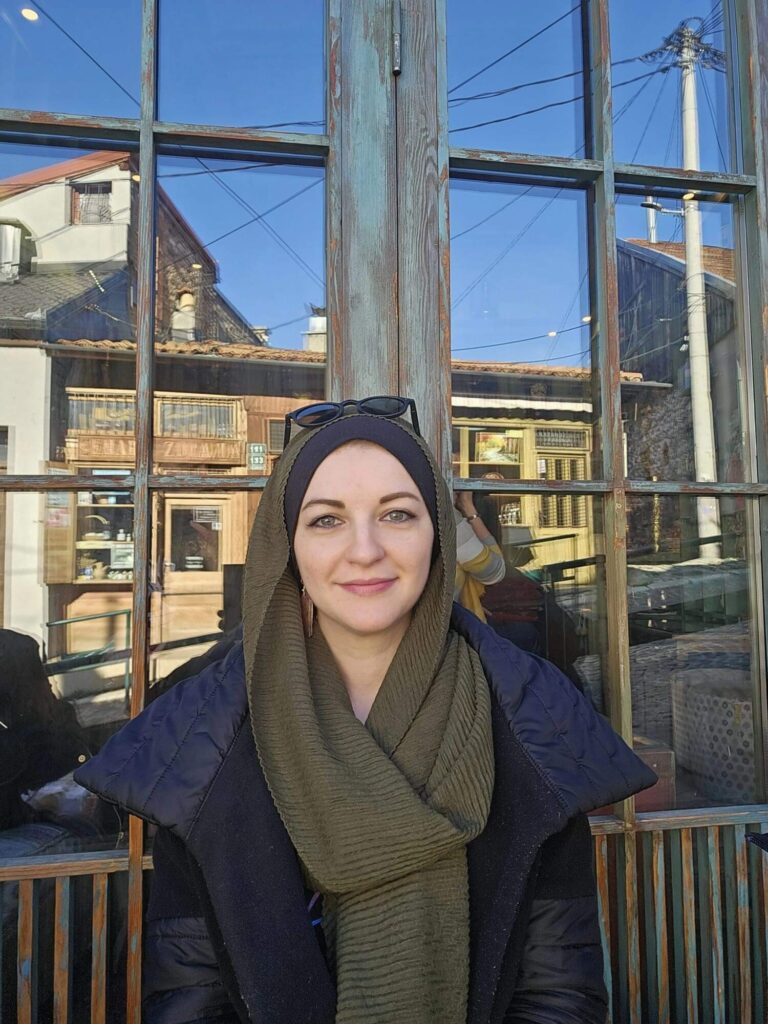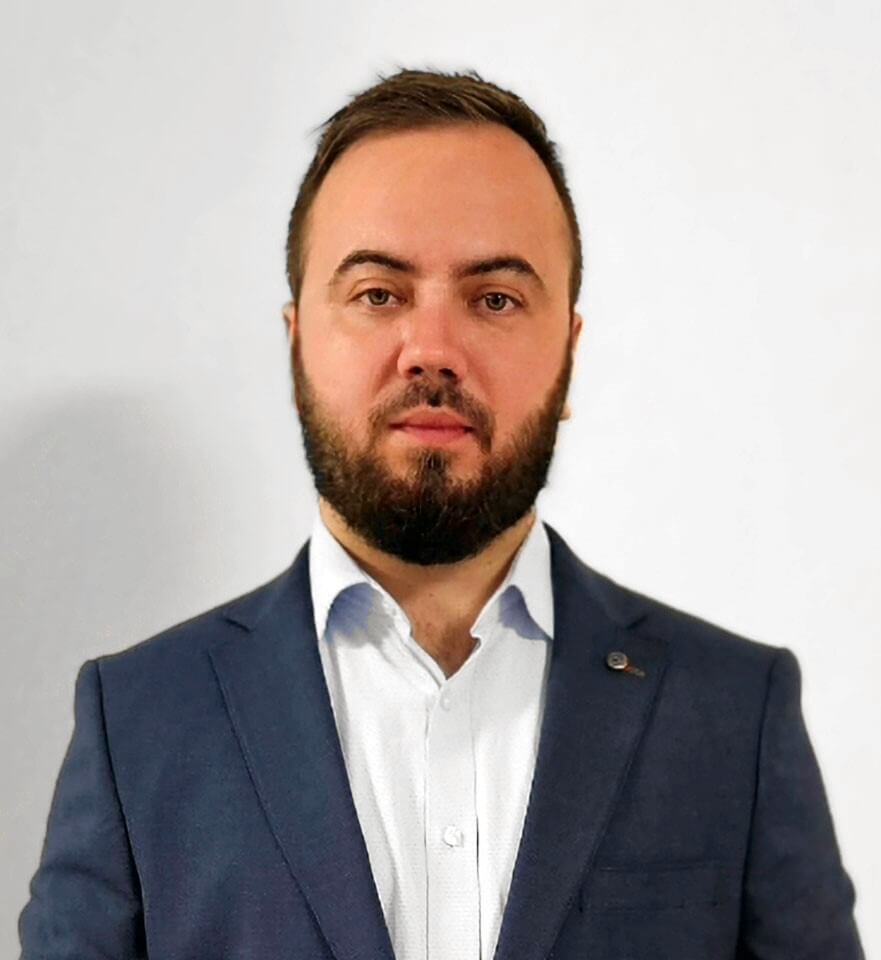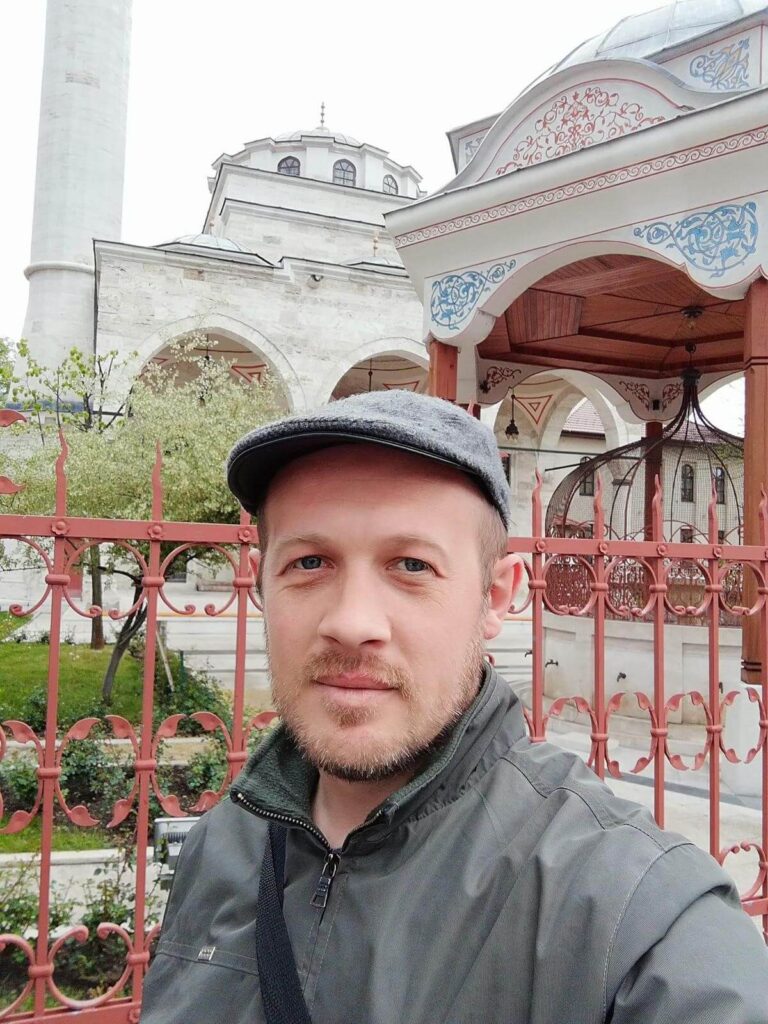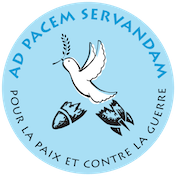In 2017, Catholic Relief Services organised the “Interreligious Dialogue and Peacebuilding Studies” Masters programme at the University of Sarajevo for the first time. The following link gives an overview of the programme and the aims of these studies :
https://www.crs.org/media-center/news-release/inspired-pope-francis-new-masters-program-interreligious-studies-and-peacebuilding
In addition, another brochure gives a brief description of the programme and its aims. It can be consulted via the following link :
https://kbf.unsa.ba/wp-content/uploads/2018/03/Joint%20master%20brochure%20AIP%20BiH.pdf
Finally, the Faculty of Islamic Studies in Sarajevo offers a detailed programme of these studies, in Bosnian only :
https://fin.unsa.ba/wp-content/uploads/2019/02/Elaborat.pdf
Amina Šurković
During this academic 2023-2024, our association “Ad Pacem servandam” is supporting Amina Šurković in her interreligious studies in Sarajevo with a scholarship funded by the sale of Ad Pacem calendars 2022.
Amina Šurković was born in Sarajevo, the capital of Bosnia Herzegovina, in 1989 and she has one brother. She obtained her master’s degree in criminology from the University of Sarajevo in 2017. She also studied Conflict Management and Humanitarian Action at the University of Siena where she got also a degree in 2021.
Amina’s parents stayed in Sarajevo during the siege (1992-95) and the war affected her whole childhood. Her family was mostly living inside the basement. Luckily or not, she was too young to remember all of that. Her father was shot during the conflict and carries the bullet in his neck to this day. Despite this, he has shown remarkable resilience, choosing not to undergo surgery due to the complexities involved in that delicate area. He is determined to continue to live and work normally despite such adversity .
On her mother’s side, the war forced her family to flee their village in Nevesinje, located in the south of Bosnia. They had to go through the mountains to reach safety in the city of Mostar. Sadly, not everyone made it through that journey. One part of the group was killed, and to this day, some of their remains have not been found. Amina’s mother lost her brother and a lot of cousins during the war.
What interests Amina most today is understanding and studying the complexity of post-war societies in her own country and in the Balkans.
She lives in Sarajevo and wants to get involved in activities aimed at promoting peace, whether in her own country or in others where inter-community conflicts have occurred.
Her motivation for the interfaith studies organised by the three faculties of Catholic, Muslim and Orthodox theology stems from her experience of working with various communities affected by the war in her country. Through her work with the War Childhood Museum (WCM), the International Organisation for Migration (IOM) and the Jesuit Refugee Service (JRS), she has seen the profound impact of armed conflict on individuals and ethnic communities. Interfaith studies allow her to explore ways of healing, reconciliation and dialogue between different religious and cultural groups in her country.
When asked whether her Islamic faith helps Amina to live peacefully with other citizens of her country who are not Muslims, she gives the following answer and examples:
“Growing up in Sarajevo, a city where people of different backgrounds live together, I learned early on to respect and get along with everyone, thanks to my Muslim faith. This belief taught me to be kind and understanding to people, no matter where they come from or what they believe.
One example of how this works is in everyday life in Sarajevo. Despite past problems between different groups, the people here have stayed strong and supported each other.
Also, my job with the Jesuit Refugee Service shows how these beliefs can help in practical ways. I work with people from all sorts of backgrounds, but we all share a desire to help those in need. My faith encourages me to do good and help others, regardless of our differences”.
Amina speaks fluently Bosnian, Serbian and Croatian as well as English. Her year of study in Siena enabled her to learn Italian.
Amina can well imagine that in the future she will be involved in different projects that are dealing with the transformation of the conflicts, but also to focus towards research and writing scientific articles.
She is very interested in contacts with other European peoples, people from Europe, and around the world, especially when it comes to a commitment to peace.
When asked what changes Amina would most like to see in her country, she answers as follows: “There are several changes I’d love to see in my country.
Firstly, I hope for greater equality and fairness for all citizens, regardless of their background, ethnicity, or beliefs.
Secondly, I’d like to see improvements in infrastructure and public services to enhance the quality of life for everyone. This means better roads, public transportation, healthcare facilities, and access to clean water and electricity, particularly in rural areas.
Additionally, I hope for greater transparency and accountability in governance to combat corruption and ensure that public funds are used effectively for the benefit of society as a whole.
Lastly, I wish to see a more inclusive and tolerant society where diversity is celebrated, and everyone feels respected and valued regardless of their differences.” (March 2024)

Vedran Mihić
During the academic year 2023-2024, our association “Ad Pacem servandam” supports Vedran Mihić in his interreligious studies in Sarajevo with a scholarship funded by the sale of Ad Pacem 2022 calendars.
Vedran Mihić was born on 11th of november 1990 in Bihać, a town in the north-west of Bosnia and Herzegovina (close to the Croatian border) where he grew up and has spent his entire life there. There he completed his education in mathematics and computer science. Today he has his permanent residence in this town. At the moment he works alternatively two weeks in Bihac and two weeks in Sarajevo.
He has no sisters and brothers and his family belongs to the Roman Catholic Church.
Vedran is a maths and computer science teacher by profession. Since 2021, he has been working for the Jesuit Refugee Service, a non-governmental organisation, whose main purpose is to accompany, serve and advocate for people on the move. This experience has encouraged him to become more actively involved in peacebuilding, especially for migrants.
Before deciding to do this, he was, for seven years, the headmaster of a secondary school in a Catholic school center for a year, and for the previous eight years he has been a teacher of mathematics and computer science at several schools in the city of Bihać.
The negative perception of migrants in Bosnia largely stems from the initial phase of the migration crisis ( since 2018) when a large amount of people arrived in Bosnia. Especially in cities such as Bihac (today around 50,000 inhabitants), where at one point there were about 5,000 migrants. Many locals were worried and feared potential threats, especially as these people initially had to sleep in the open, in parks, due to a lack of accommodations. Over time, however, the situation has changed as communities have become more engaged and negative attitudes towards migrants have diminished thanks to improved infrastructure and support systems.
Vedran wants to help motivate people in his country to get to know and understand refugees and their situation in order to accept them as citizens. Through his work with the Jesuit Refugee Centre, he understands how important it is to find a common way of living together and promoting peace.
The Jesuit Refugee Centre is active in three cities in Bosnia. In Bihac, the center runs two reception centres – one for single men and the other for families. Two reception centers are also run in Sarajevo and Ukrainian refugees are helped in Medjugorje. The activities of these camps are primarily focussed on psychosocial support. In addition, various services are offered: hairdressing salon in the camps for single men, a communal kitchen in the family camp in Sarajevo and access to psychologists for counselling sessions. There is also a day center for migrants and refugees in Bihac, which offers humanitarian aid and opportunities for cultural exchange. Educational programmes, including language lessons and workshops are also run in the camps. A flagship project is a reception center in Sarajevo for unaccompanied minors, where comprehensive support, including education, healthcare and accommodation are offered. In Medjugorje, monthly assistance and psychosocial activities are offered to Ukrainian refugees; medical assistance, including the provision of glasses, hearing aids and dental treatment, are provided as well according to individual needs. A free camp for single men is run in Sarajevo offering essential items.
Furthermore, Vedran has been a member of the Interfaith Council in Bosnia and Herzegovina for three years, where he has successfully implemented several projects that are important for the local communities in terms of peace-building.
The main goal of the Interfaith Council in Bosnia is to promote unity between people of different religions and ethnic backgrounds. The Council organises various cultural and sporting events and encourages all communities in Bosnia to participate. Vedran would like to integrate this council again, as soon as his current workload and his actual interreligious and peace building studies will allow it.
In addition to his mother croatian language, he is also fluent in English.

Emin Bakal
During the academic year 2023-2024, our association “Ad Pacem servandam” supports Vedran Mihić in his interreligious studies in Sarajevo with a scholarship funded by the sale of Ad Pacem 2022 calendars.
Emin Bakal, who also benefits from the scholarship of “Ad Pacem servandam” is studying during the academic year 2023-2024 the interreligious studies in Sarajevo. He was born 1984 in Čajniče, in the south-east of Bosnia and Herzegovina. He was eight years old when the war began in 1992. Čajniče is a small town on the border with Montenegro, where around 5,000 Serbs and Bosniaks lived before the war in a 50 to 50 ratio. Due to the ethnic cleansing and genocide made by the Serbs during the war, only Serbs live today in Čajniče.
Emin is a direct victim of the war, as his father and 17 other relatives and neighbours, mostly men, were killed as civilians in May 1992. His village was completely destroyed and is now abandoned and deserted. At eight years old, he became an orphan.
After graduating from high school, Emin studied at the University of Sarajevo at the Faculty of Political Science and at the Faculty of Islamic Studies.
Nowaday, he is a teacher of Islamic theology and holds a Master’s degree in Security and Peace Studies.He returned to his hometown and lived there for ten years, working to alleviate the consequences of the war.
Today he lives and works as an imam in Sarajevo, is married and has three children.
He sees it as his life’s work to promote peace in all kinds of situations and he supports all co-operation in building peace in his country. Moreover, he considers justice and the implementation of law as the key to make bosnian society better. For Emin, war is the greatest nonsense that people can make and states that there are no winners in war. His greatest wish is that what happened to him never happens to anyone again.
That’s why he enrolled on an inter-religious course at the university of Sarajevo.
Additionnally, he speaks english, bosnian, macedonian and arabic.


